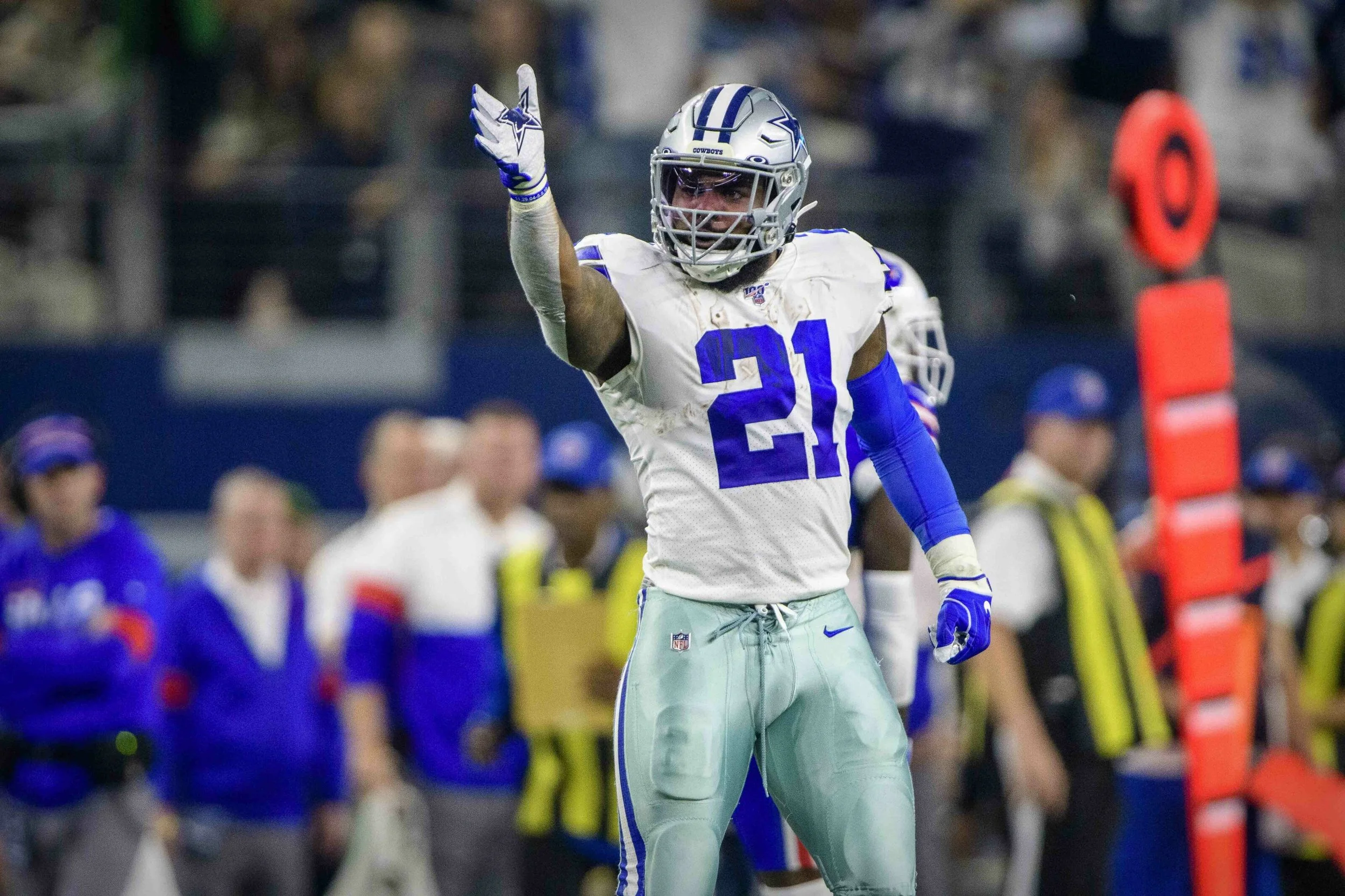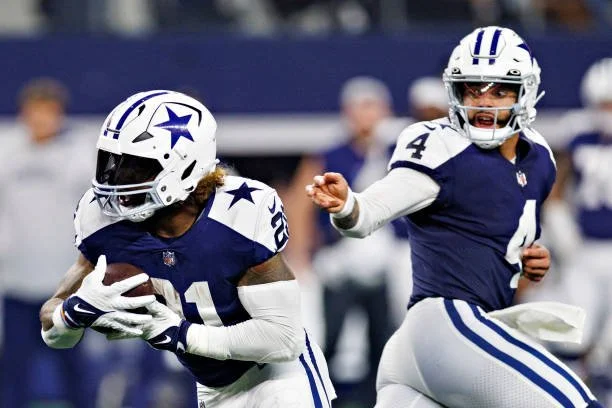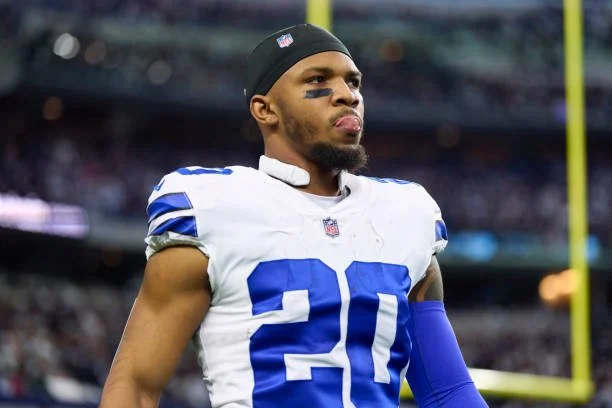Why The Cowboys Made A Mistake In Releasing Zeke
Credit: Jerome Miron — USA Today Sports
DALLAS, Texas (PSF) — Ezekiel Elliot is not everyone’s cup of tea.
Aside from the notoriety and dislike that comes from being a Dallas Cowboy, Elliott is also not the most orthodox player or personality either, which makes him an easy target for his haters. He is one of those “you either love him or hate him” individuals. Yet what has been unanimously agreed about him is the fact that he has been one of the cornerstones of the post-Tony Romo Cowboys era.
However, while this relationship has been very fruitful for both sides, a shift in the offensive scheme as well as the emergence of Tony Pollard had made Zeke a role player within the current offense this past season.
Rather than be the focal point, Zeke became a utility player that was mostly used for goal-line TDs. In fact, his workload had diminished to such an extent that his starts to games felt more like legacy starts rather than him being the primary running back of the Cowboys.
The change in how Zeke was perceived in both the media and within his own organization naturally brought up discussions throughout the year about whether or not Dallas should cut ties with the player, as the running back is a position where players quickly peak and age out, in addition to being easy to replace.
In the end, just recently the Dallas Cowboys announced that they were indeed releasing Elliott after having been with the team ever since getting drafted in the 2016 NFL Draft.
While many saw this move coming after news came out that owner and general manager Jerry Jones and Elliott were in disagreement over restructuring Elliott’s contract, I disagree with the overall consensus (especially within the media) that this move was necessary.
Ever since Kellen Moore took over as offensive coordinator, the Cowboys offense went from being the best run game in the league to a passing attack that highlighted more of quarterback Dak Prescott’s potential as a team carrier. Prescott joined the league together with Elliott in 2016, where he replaced incumbent Tony Romo as the starting quarterback just prior to the opening game after Romo fractured his collarbone while getting hit as he was sliding in the preseason finale.
While he had dazzled fans with his play in the preseason backing up Romo, Dak was seen as this raw and unpolished player that was high on intangibles, but needed to be somewhat protected to avoid getting exposed/overwhelmed. As such the team heavily leaned on the run game, led by Zeke, who was Cowboys’ fourth overall draft pick in that year’s NFL draft after being the consensus top RB prospect out of college.
While the Cowboys had a good squad already, many had lowered their expectations as to where Dallas would be by the time Tony Romo returned. What nobody expected was the Cowboys to run away with the regular season.
By the time Romo returned, the Cowboys had already secured a playoff berth, and in the ruthless nature of the NFL, the organization decided not to mess with team chemistry, and instead put their faith in Dak by rewarding him with the starting QB position.
While the Cowboys folded in typical Cowboy’s fashion in the playoffs, the success of Dak and Zeke (with the former becoming First Team All-Pro, and the latter winning the Offensive Rookie of the Year) ushered the franchise into a new era that was built on their two young stars and their league-best offensive line. From that season forward, the Cowboys always made the playoffs in seasons where Dak and Zeke didn’t miss significant time.
The duo of Zeke (left) and Dak have been essential to the success of the Cowboys since they both entered the league in 2016.
Credit: Wesley Hitt/Getty Images
The injury aspect is important, because the first year after their rookie season Elliott struggled with injury and missed four games, causing the Cowboys to depend on Dak to win them games rather than their very successful dominating run game. The Cowboys couldn’t overcome the deficit caused by Elliott’s absence, and was unable to make the playoffs. The inconsistent play of Prescott during that span further solidified Elliott’s importance to the team’s functionality as its heart and engine.
Aside from being a dominating interior rusher, the following year Zeke also became a very effective pass catcher, evolving in his role as the team’s primary weapon. “Feed Zeke” as fans and the media would call it, Elliott embraced the notion with his own signature celebration as well, carrying the team on his back through the unpredictability caused by his supreme talent both as a catcher and a runner.
While Dak once again found his form as well, he was serving as the complementary piece to Zeke, taking advantage of the attention teams would pay to Elliott rather than him. This combination was deadly in the sense that, whilst the Cowboys were still the Cowboys in the playoffs, at least as a regular season team they had established some footing and consistency.
Yet, the disappointments in the playoffs naturally prompted change by the overambitious Jerry Jones. Jones promoted former QB-turned-QB coach Kellen Moore as the team’s next offensive coordinator to change up the playbook and utilize Dak more as a thrower rather than a play-action threat. The result was a highly innovative, explosive, and high-scoring Cowboys offense that resulted in several statistical career highs for Prescott.
But while it wasn’t a bad statistical year for Elliott either, the shift in focus resulted in Zeke’s value becoming diminished since he no longer was essential to the game plan. While Zeke was a good pass-catcher, it was the fact that his pass-catching complemented his running that made him the weapon he was. With the new style of the Cowboys, the running back was mostly a receiver rather than a rusher, which made other players more suitable for that role. And that is where Tony Pollard comes in.
While Tony Pollard is a good player himself. He never really challenged Elliott’s hold on the position until very recently. It was only when it became obvious that the new Cowboys offense required a running back that was a receiver first, a rusher second that the Cowboys realized Ezekiel Elliott was worth less than the premium dollars they were paying for him.
It was a certain play-style and a certain game plan and his achievements within that that got Zeke his massive contract. In the eyes of Jerry Jones and the rest of the management, Zeke wasn’t worth the money anymore because the Cowboys no longer played that way, and they already had Pollard who is substantially cheaper and better as a pass catcher than Zeke is at this stage of his career.
The emergence of the cheaper Tony Pollard made the once indispensable Elliott expendable.
Credit: Cooper Neill/Getty Images
However players like Zeke don’t fall from the apple tree very often, whereas you can find a Tony Pollard every year whether he is a free agent, first-round pick, or even an undrafted player.
Cowboys had DeMarco Murray as their MVP candidate in 2014, but cleverly avoided giving him a huge new contract following that season, and Murray ended up being a bust the very next year for division rivals Philadelphia Eagles.
The point with that is the Cowboys are right now betting on Elliott turning out to be another DeMarco Murray, whereas I think they are letting a potential Super Bowl contender get a free pass on an elite NFL running back. A team like the Buffalo Bills who desperately lacked a reliable ground game could easily get to the promised land even if Zeke is only 70% of the player he once was. I believe this was another poor judgment on Jerry Jones’ part; he once again jumped the gun, and the Cowboys will most likely go a record resembling 7-10 next season while trying to rebuild their offense.
A “finished” Ezekiel Elliot gave you a very solid 12 TDs, and your choice is to cut ties with him while not fully replacing his role in the team. Because, while Pollard will indeed become more prominent now, it was the presence or rather the aura of Elliot that eased pressure and attention on Prescott, Pollard, and the team’s other notable offensive weapon CeeDee Lamb. If Pollard slides into the role of Elliot, who takes the role of Pollard next season?
Dallas already sacrificed their No:1 wide receiver Amari Cooper for very similar reasons the year before in order to save money and clear the way for the slightly younger Lamb. Now it is the same course of action for Tony Pollard. In both instances, the Cowboys didn’t fill the gap that was left void. They either have a surprise name like Odell Beckham Jr. lined up that we are not aware of, or they’re banking on finding somebody from the draft.
Either way, I expect next season to be a humbling reality check for Jerry Jones; one that should mobilize the fan base to finally give the Jones family a firm warning to quit messing around with their franchise.


